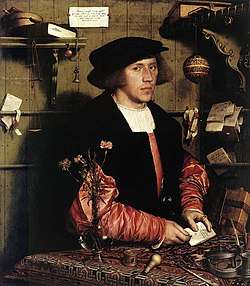Commerce
Commerce is the exchange of goods and services, especially on a large scale.[1] It includes legal, economic, political, social, cultural and technological systems that operate in a country or in international trade.

In the economic sense, "commerce" refers to the conduct of trade among economic agents.[2] Commerce generally affects the well-being and welfare of citizens and residents, as it is known to directly impact the money which people have and their job opportunities as well. The term "commerce" may also refer to the buying and selling of commodities globally or across borders - between governments and between business firms.
Many scholars and ancient philosophers have known to mix up the terms "trade" and "commerce". But in essence these two are distinct terms carrying different meanings:
- Trade, on the one hand, may mean the selling and buying of commodities for money or anything of value
- Commerce covers a much broader field and includes trade, along with the services which facilitate such buying and selling of goods. These services may include insurance, warehousing, transporting and advertising.
Nevertheless, one can speak of "trade in goods and services".[3]
Etymology
The English-language word commerce has been derived from the Latin word commercium, from cum ("together") and merx ("merchandise").[4] The word then got converted to French language to finally give us "Commerce" which essentially means facilitating trading or allowing for exchange of goods and services.
History
Apart from traditional self-sufficiency, trading became a principal facility of prehistoric people, who bartered what they had for goods and services from each other (the barter system was popular in ancient times where one could get goods and services by offering the other person some other good and service according to their need instead of paying with monetary systems, which developed later). Historian Peter Watson and Ramesh Manickam date the history of long-distance commerce from circa 150,000 years ago.[6] Roman commerce included routes across the Mediterranean and to and from India.
In historic times, the introduction of currency as a standardized money facilitated the wider exchange of goods and services. Numismatists have collections of tokens, which include coins from some Ancient-World large-scale societies, although initial usage involved unmarked lumps of precious metal.[7] This means that even if there were no notes or coins people used precious metal like Gold, Silver etc. attached a value to it and then use them for exchange in return for commodities.
The circulation of a standardized currency provides a method of overcoming the major disadvantage to commerce through use of a barter system, the "double coincidence of wants" (which means if someone wants something from a person, that person should also be in need of a thing or a service which they can provide), necessary for barter trades to occur. For example, if a person who makes pots for a living needs a new house, they may wish to hire someone to build it for them. But they cannot make an equivalent number of pots to equal this service done for them, because even if the builder could build the house, the builder might not want many or need any pots.
The barter system also has a major drawback in that whatever goods a person gets as payment may not necessarily store for long amounts of time. For example: if a person receives dozens of fruits as payment, the fruit may not store for long or may rot - which means that person will have to bear a loss.
Currency alleviated these problems by allowing a society as a whole to assign values and thus to collect goods and services effectively and to store them for later use, or to split them among minions.
During the Middle Ages, European commerce developed through the trading of luxury goods at trade fairs. Some wealth became converted into movable wealth or capital. Banking systems developed where money on account was transferred across national boundaries.[8] Hand-to-hand markets became a feature of town life, and were regulated by town authorities.[9]
Today commerce includes as a subset of itself a complex system of companies which try to maximize their profits by offering products and services to the market (which consists both of individuals and groups and other companies or institutions) at the lowest production cost. A system of international trade has helped to develop the world economy; but, in combination with bilateral or multilateral agreements to lower tariffs or to achieve free trade, has sometimes harmed third-world markets for local products (see Globalization).
Components
A majorly important component of commerce is trade. It is essentially a smaller version of commerce in a way that it refers to the actual buying and selling of goods only. Commerce includes all the activities related to trade such as:
- Insurance: Protection of goods against theft, fire etc. any human or natural calamity as stipulated before hand
- Banking: Related to financing of the transactions
- Warehousing: Puts focus over storage related issues such keeping goods in a safe place such as a "warehouse" until they are sold to the customers, etc.
- Transportation: This involves carrying goods from the place of their production to their actual place of sale
- Advertising: Concerns the marketing communication of promoted goods to be sold
See also
- Advertising
- Bachelor of Commerce
- Business
- Capitalism
- Commercial law
- Distribution (business)
- Cargo
- Eco commerce
- Economy
- Electronic commerce
- Export
- Fair
- Finance
- Fishery
- Harvest
- Industry
- BBA
- Import
- Laissez-faire
- Manufacturing
- Marketing
- Marketplace
- Mass production
- Master of Commerce
- Merchandising
- Trade
References
| Look up commerce in Wiktionary, the free dictionary. |
- "commerce". English: Oxford Living Dictionaries. Oxford University Press. n.d. Retrieved December 11, 2018.
1 The activity of buying and selling, especially on a large scale.
- Commerce Definition - "Commerce is the conduct of trade among economic agents. Generally, commerce refers to the exchange of goods, services or something of value, between businesses or entities."
- For example: "Report of the Commission on Trade in Goods and Services, and Commodities [...]". United Nations Conference on Trade and Development. Commission on Trade in Goods and Services and Commodities. 2005. Retrieved 29 January 2020.
- Chisholm, Hugh, ed. (1911). . Encyclopædia Britannica. 6 (11th ed.). Cambridge University Press. p. 766.
- Hans Biedermann, James Hulbert (trans.), Dictionary of Symbolism - Cultural Icons and the Meanings behind Them, p. 54.
- Watson, Peter (2005). Ideas : A History of Thought and Invention from Fire to Freud. HarperCollins. ISBN 0-06-621064-X. Introduction......./
- Gold served especially commonly as a form of early money, as described in "Origins of Money and of Banking" - Davies, Glyn (2002). Ideas: A history of money from ancient times to the present day. University of Wales Press. ISBN 0-7083-1717-0.
- Martha C. Howell (12 April 2010). Commerce Before Capitalism in Europe, 1300-1600. Cambridge University Press. ISBN 978-0-521-76046-1.
-
Fernand Braudel (1982). Civilization and Capitalism, 15th-18th Century: The wheels of commerce. University of California Press. p. 30. ISBN 978-0-520-08115-4.
Taken over by towns, the markets grew apace with them.
